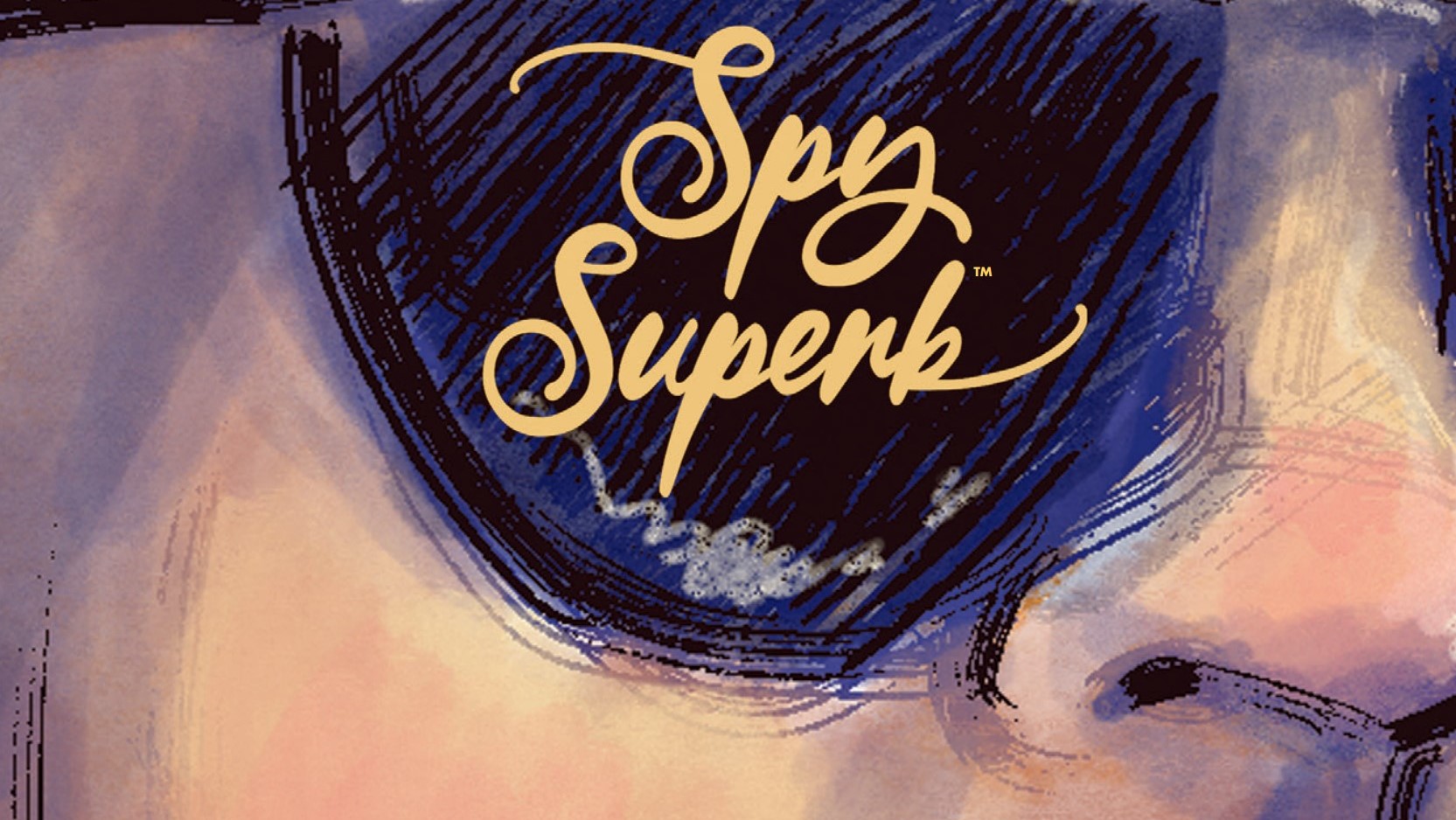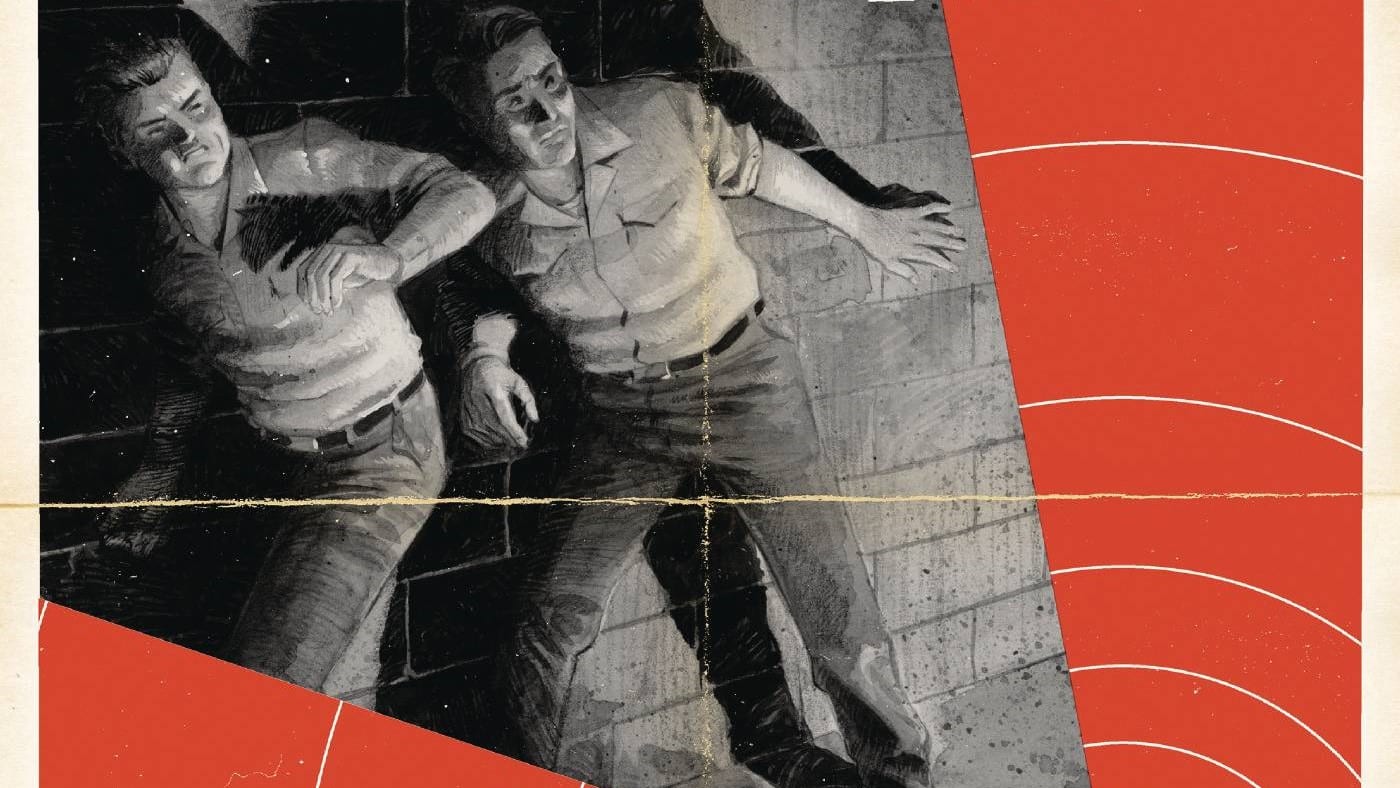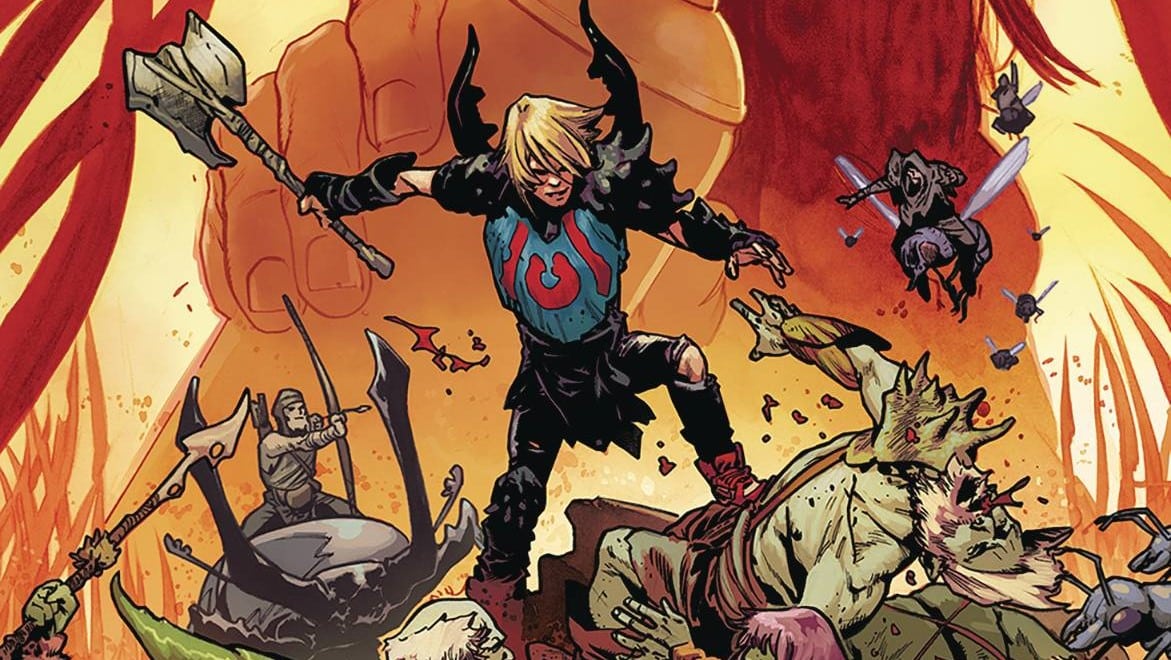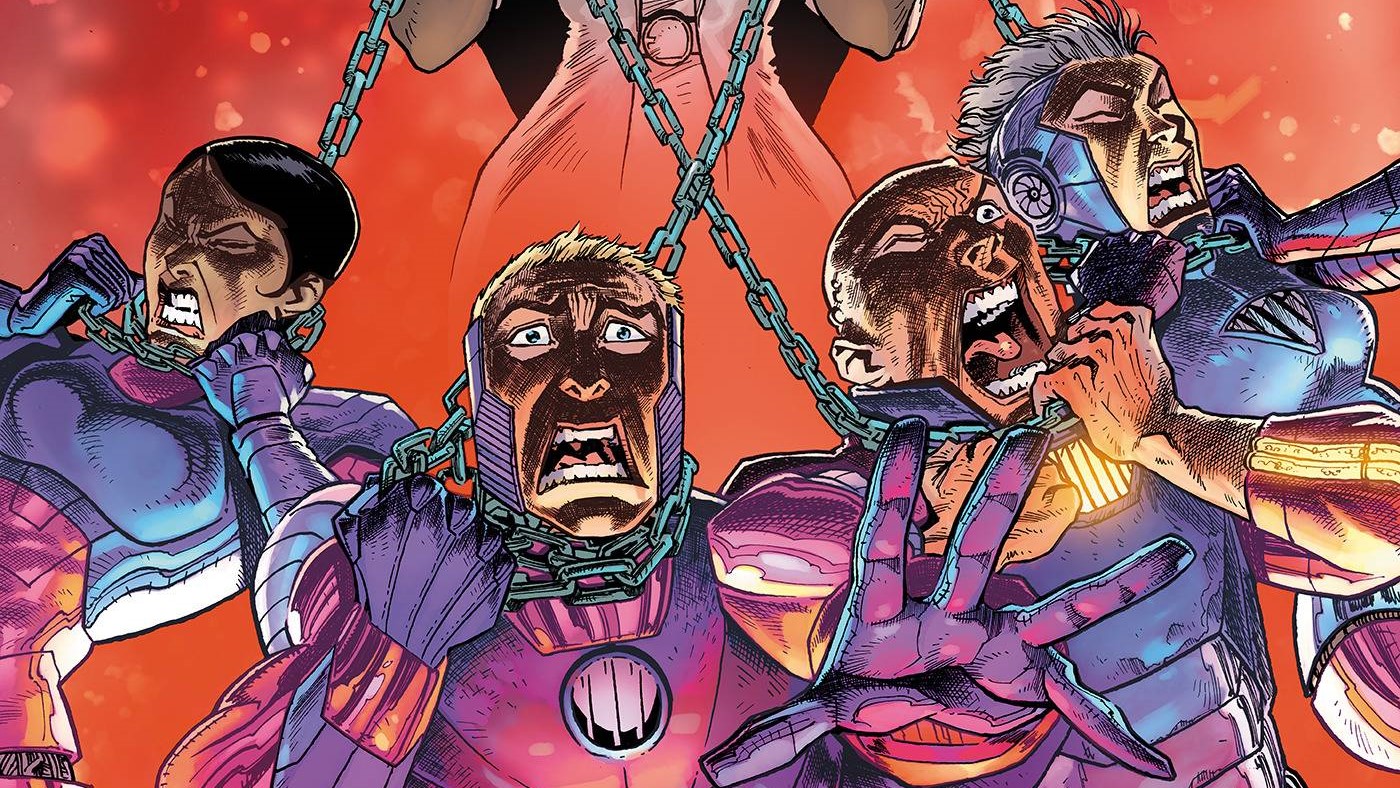Ron Livingston gets farther away from everyone and everything he’s ever known and closer to the end in Traveling to Mars #2, written by Mark Russell, drawn by Roberto “Dakar” Meli, colored by Chiara di Francia, lettered by Mattia Gentili and published by Ablaze.
Actress Maisie Wade confronts the murderous fans who’ve invaded her home and learns of their shocking plans in Rogues’ Gallery #2/#3, written by Hannah Rose May, with story by May and Declan Shalvey, drawn by Justin Mason, colored by Triona Farrell, lettered by Hassan Otsmane-Elhaou and published by Image.
The best spy is someone who doesn’t know they’re a spy … and they’re also irritating as hell in Spy Superb #1, written, drawn and lettered by Matt Kindt, colored by Sharlene Kindt and published by Dark Horse.
Will Nevin: I know one of our Established Bits(™) is that I’m terrible at picking comics to read. But you know, I hope I get at least *some* credit for picking up and suggesting we continue to look at Traveling to Mars because as good as #1 was, #2 was even better.
Ian Gregory: I can’t take this one away from you, Will. Nice work. I think we may very well be approaching our third Freshest Chicken.
Will: Rogues’ Gallery was … well … not as good. Or at least I thought it wasn’t. You’re free to disagree — at least until I deceptively edit your comments.
Ian: Yes, yes, and it just so happens that I was the one to say we should keep reading it. I see how this is. Don’t worry, Will, I agree that this week, your picks are superior to mine.
Will: Oh, we’re going to finish Rogues’ Gallery since it’s only four issues, and I promise it won’t be to spite you. But I reckon we should get to it.
Ian: “Reckon?” Already getting into character, I see.
Will: I am, and shall ever be, Alabama Man.
Traveling to Mars #2: In Space, No One Can Hear Your Heart Break

Will: Let’s start with the art and the visual storytelling here. I love the life and animation Meli brings to Roy’s robotic companions, and some of the closeups on his face are stunning — getting across every bit of his illness and regret.
Ian: The scenes with his mom are really well done. This whole book hinges on convincing us that Roy, and the other characters but Roy especially, have authentic emotions and are people we can relate to. This isn’t the kind of book where you can look past bad art to enjoy a unique setting or story; if the art isn’t firing, then the whole thing is a bust.
Will: Speaking of regret, this issue was brimming with it, including Roy’s conversation with his mother and his longing for his ex-wife. With all of its sci-fi and geopolitical trappings, I’m shocked at how this earnest-as-hell series is able to ground itself with a relatable character. And that’s an important thing for me — even in the biggest, dumbest books, I want to find people who are driven by real emotions and making decisions that make sense in light of those feelings.
Ian: As I mentioned above, I really wondered how this book would continue after the first issue. I was pleased to see that we stayed close to Roy’s history and feelings. I like that Russell is committed to doing a full exploration of his character, and not heading off into action plot territory or something. I really liked the emphasis on Roy’s daily life on the ship — and how it clearly wasn’t meant for human habitation, and that the amenities promised to him never really materialized. It’s a critique of capitalism — of the human as capital — that meshes well with Roy’s character and doesn’t distract from the human element. In fact, this story centers the human cost of capitalism.
Will: What do you figure is the happiest ending we could have here? Roy making peace with all his mistakes and dying a hero’s death for a fake meat company? Maybe some way he cheats death without it feeling unearned? I feel like there’s some twist to be had in the story — but I don’t think I’ll be disappointed if it doesn’t come.
Ian: I think we’re starting to get hints that Roy is becoming like a parent to these robots, and he’ll take a more active role in their mental development. The fact that they’re capable of rewiring and rebuilding parts of the ship indicates to me that they may take steps to help Roy in some way — either by prolonging his life, or even bringing him back to Earth. Ultimately, I suspect that the “legacy” he wishes he could leave (indeed, he mentions wishing he had kids) will end up being those two robots.
Will: Given that Russell also wrote The Flintstones and Not All Robots — which explored some of the same ideas — we could very well be headed in that direction, which is one that hadn’t occurred to me. Smart shit there, Ian.
Rogues’ Gallery #2/#3: Close to Greatness, but Not Close Enough

Will: Ian, here’s a tip for you: Don’t get old. I thought we had covered the second issue, but I couldn’t find any place where we had, and I also couldn’t remember reading it, but maybe I did? Again, old man brain is a tough thing. Putting aside my failures for a moment, let’s talk about the book. Thing is, I don’t think it’s working as a narrative because it can’t decide what it wants to be. Is it a satire about how we’re all assholes when we project and pick apart media and those involved in its creation? Or maybe it’s just a bloody action thriller? I don’t think it can be both if either is going to be effective — I can’t take this seriously as a critique of fan culture when those fans are deranged murderers, and I can’t enjoy it as a thriller when we saw those fans in issue #1 blathering about the perceived faults in a television show.
Ian: You’re right that the seriousness of the fans as villains is majorly undercut by the first issue. They’re so whiny, so pathetic in issue #1 that their sudden, immense heel turn is a little silly. It’s been a while, but I think this would work better if they were much more clearly malicious in Act One — they’re annoying, misogynistic and snotty, but we’re also limited to the perspective of the one fan who seems to have doubts about everything. Because we’re jumping perspectives, it’s not quite a home-invasion horror story (classic of classics), and it’s not quite a satire. Actually, I think this series would work much better with a totally different structure, but more on that below.
Will: Oooh, I can’t wait.
Ian: I felt that this issue (that is, #3) was the strongest because it finally feels like a story with purpose. I wish this is where we had been all along. Moving forward, I expect it’s setting up a “twist” where one of the fans has doubts and turns on the others, helping Maisie, but because we spent a whole issue in the heads of those fans, and then two with Maisie, we don’t really know who we should be caring about. I think it’s really close to something interesting, but the execution is too muddled to get there.
Will: There are smaller moments that didn’t work for me too, like when Maisie quits her TV show and then is distraught when it’s canceled because the ratings are in the shitter. That’s over-complicating the story. Same thing when the fan ringleader runs the honeypot on her assistant. Messy, noisy ideas that don’t do anything for the story. Also, if Maisie is the “real fan” that readers should (rightly) believe her to be, shouldn’t she know these guys are reenacting her character’s seminal moment in the fake comic without having to consult said comic? And I guess she just *had* to check the book to make sure that was what was happening? Such a strange moment to go after memorabilia while intruders are murdering people in your home.
Ian: Yes, well, the story needed a visual aid so the readers would understand the reference, I guess. Like I said, I think you could keep the general thrust of this story and have something really interesting, if you were willing to make aggressive cuts. Get rid of the first issue. Combine issues #2 and 3, so that they end on the same point, and then do the rest of the story as a locked-house horror story with flashbacks to the details about the show and the fans. Maybe even gradually reveal that the attackers are actually fans of the comic over time, instead of all in the first issue. I think there’s some horror to be mined from the idea that the angry people on the internet could show up in your life at any time.
Will: Shit, your outline of this series is *much* better. Nothing wrong with the art here, though. Good colors and use of shadows to speak to the seriousness of what’s going on … which unfortunately is usually undercut by what else is happening on the page.
Ian: I love the art! It’s a big part of why I think this series could be really great. The character designs are pretty great here too, both the costumes and the street clothes. This is the kind of book where we’re so close to greatness, and it hurts that things could have been different.
Spy Superb #1: Like Slapstick, but in the Funny Pages

Will: Lemme ask you this, Ian: Can physical comedy work in a comic book? Because I like the premise here — a fusion of Mr. Magoo and James Bond, as it were — but I’m not sure that the action scenes worked, and I don’t know whether that owes to the art style or the limitations on what you can do with pratfalls in sequential visual storytelling.
Ian: Physical comedy is really, really hard to do in a static medium. What made the masters of slapstick so compelling was their absolute mastery of movement. Go watch Duck Soup again — Harpo is constantly in motion. He’s priming the scene, setting up gags and drawing the viewer’s eye like a stage magician. Or look at the mirror scene, where the comedy is to be found in the smallest, most narrow movements. That’s the kind of stuff you just can’t convey in comics — or if you can, I haven’t seen it yet.
Some of the slapstick here really works. The scene where the original Spy Superb blows himself up with a bomb is fantastically funny, and it works because it’s like a smash cut. No motion required. The scene where the new Spy Superb accidentally kills a squad of hitmen lacks something vital. I did like the gag where he gets surrounded and goes, “Oh! You’re finally here!”
Will: Let’s talk more about the visual style here — I don’t have much history with Kindt’s work, but I think this hit me in an uncanny valley of sorts, stuck between something more realistic and the straight, flat, cartoony style of someone like Kyle Starks. Professional, quality work, absolutely, but not something that worked for me here.
Ian: I liked it a lot, to be honest. Part of that is just that we read so much stuff doing standard comic book art (or variations thereof) that seeing something genuinely cartoony is a nice change of pace. There’s also a kind of bande dessinée vibe to this that really works for the setting.
Will: Ultimately, I liked it? I think? Silly, fun stuff.
Ian: This premise is … superb. I loved the put-upon Handler, a master manipulator staring down a major crisis and being forced to rely on the biggest imbecile of all. I loved our insufferable little main character with his terrible novel and his terrible attitude and weapons-grade obliviousness. I definitely want to see more of this series, Will.
Will: Duly noted, Ian.
Does This Smell OK?
- Sound Effects Watch: In Rogues’ Gallery, when the assistant gets shot there’s a fantastically messy “BANG” that splays out from the gun like blood spatter.
- For the next time Ian doesn’t get a reference and complains it’s too old: Duck Soup, a Marx brothers film, was released on Nov. 17, 1933.
- Rapid fire questions:
- It’s the end of the world. Who are your two final companions?
- Will: Bourbon and my close friend, More Bourbon.
- Ian: My large, beautiful cat, Saint Osyth, and her last, extremely stinky poop.
- Will: Definitely does not smell OK.
- What’s the most obnoxious thing fans have ever done?
- Will: Reylo. Gross and bad and awful for so many reasons.
- Ian: Where even to start? I guess, like, Gamergate or something. Christ.
- Who’s the best super spy around?
- Will: I want me to say Bond, so I’ll say Bond.
- Ian: The effortlessly slippery Miles Kendig.
- It’s the end of the world. Who are your two final companions?
- I would like to never again consider the concept of a “chili cheese beer,” thank you.
- For the record, Big Government says most of your leftovers should be tossed after four days in the fridge. Cowards.
- I’m still not exactly sure what rillette is, but using leftover meat to make a delicious slurry sounds fine to me.







